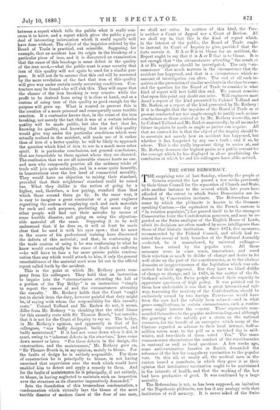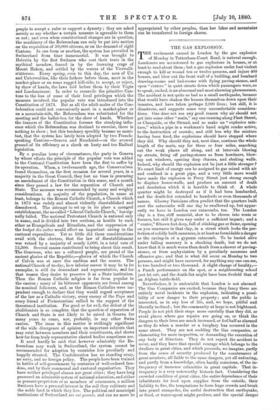THE SWISS DEMOCRACY.
THE surprising rote of last Sunday, whereby the people of Geneva rejected the law passed a few weeks previously by their Great Council for the separation of Church and State, adds another instance to the several which late years have afforded of the extent to which Swiss Democracies are in- fluenced by Conservative instincts. The Referendum (the name by which the plebiscite is known in the German- speaking Cantons,—the equivalent in the French cantons is "la votation populaire,") has proved itself to be the strongest Conservative force the Confederation possesses, and may be re- garded as the Swiss analogue of the English House of Lords, albeit its decisions are often marked by more intelligence than those of that historic institution. Since 1874, five measures, recommended by the Federal Council, and which had re- ceived the assent of both branches of the National Assembly —elected, be it remembered, by universal suffrage— have been vetoed by the popular vote. All these measures were, in some sense, innovations, and owed their rejection as much to dislike of change and desire to let well alone on the part of the constituencies, as to the obvious demerits or inopportuneness of the legislation which was sub- mitted for their approval. But they have no blind dislike of change as change, and in 1878, in the matter of the St. Gothard subsidy, the Swiss pectple showed their capacity to appreciate questions of high policy. It was pointed out to them how undesirable it, was that a great international rail- way, traversing the territory of the, Confederation, should be exclusively owned by two foreign Powers—as would have been the ease had the subsidy been refused—and in what grave complications, in certain circumstances, such a contin- gency might involve the country. These arguments com- mended themselves to the popular understanding, and although the granting of the subsidy put a strain on the national resources, for the benefit of an enterprise which many of the Cantons regarded as adverse to their local interest, half-a- million voters went to the poll on a wretched day in mid- winter, and two-thirds of them voted "Yes." The same common-sense characterises the conduct of the constituencies in cantonal as well as local questions. A few weeks ago, some anti-vaccination fanatics in Zurich demanded the reference of the law for compulsory vaccination to the popular vote. On this all, or nearly all, the medical men in the canton issued a manifesto, in which they gave it as their opinion that involuntary vaccination ought to be maintained in the interests of health, and that the working of the law had been productive of good. It was confirmed by a large majority.
The Referendum is not, as has been supposed, an imitation of the Napoleonic ph.3biscite, nor has it any analogy with that institution of evil memory. It is never asked of the Swiss people to accept a ruler or support a dynasty ; they are asked merely so say whether a certain measure is agreeable to them or not ; and even when constitutional changes are in question, -the machinery of the Referendum can only be put into motion on the requisition of 30,000 citizens, or on the demand of eight 'Cantons. In one form or another, the system has prevailed in Switzerland from time immemorial. It was brought to Helvetia by the first Switzers who cast their tents in the mythical meadow, fenced in by the frowning crags of Mount Haken, and settled by the waters of the Vierwald- stiittersee. Every spring, even to this day, the men of Uri and Unterwalden, like their fathers before them, meet in the market-place or on some rugged hill-side, to accept, or reject, by show of hands, the laws laid before them by their Viigte and Landamiinner. In order to reconcile the primitive Can- tons to the loss of some of their local privileges which the measure involved, the popular vote was introduced into the Constitution of 1874. But as all the adult males of the Con- federation could not conveniently meet in a market-place or on a mountain-side, the Referendum was substituted for the meeting and the ballot-box for the show of hands. Whether the framers of the Constitution foresaw the steadying influ- ence which the Referendum was destined to exercise, there is nothing to show ; but this tendency speedily became so mani- fest, that the system has lately been adopted by two French- speaking Cantons—Geneva and Neuchittel—on the avowed ground of its efficiency as a check on hasty and too Radical legislation.
By a peculiar irony of circumstance, the party in Geneva by whose efforts the principle of the popular vote was added to the Cantonal Constitution have been the first to suffer by its operation. When, a twelvemonth ago, the Conservatives found themselves, on the first occasion for several years, in a majority in the Great Council, they lost no time in procuring an amendment of the Constitution in this sense, and a month since they passed a law for the separation of Church and State. The measure was recommended by many and weighty considerations. A majority of the population, in name at least, belongs to the Roman Catholic Church, a Church which in 1873 was rudely and almost violently disestablished and disendowed. The attempt to set up in its place a mongrel establishment, the so-called "Liberal Catholic Church," has sig- nally failed. The national Protestant Church is national only in name, and is divided into two sections, as hostile to each other as Evangelicals and Ritualists, and the suppression of the budget des cultes would effect an important saving in the cantonal expenditure. Yet so little did these considerations avail with the electors, that the law of disestablishment was vetoed by a majority of nearly 5,000, in a total vote of 13,300. Several causes contributed to bring about this result. The Genevese, who are a cultured people, are proud of the ancient glories of the Republic,—glories of which the Church of Calvin was at once the emblem and the source. The national Church of to-day, how inferior soever it may be to its exemplar, is still its descendant and representative, and for that reason they desire to preserve it as a State institution. Then the Roman Catholic religion is far from popular in the canton ; mans' of its bitterest opponents are found among its nominal followers, and, as the Roman Catholics were im- prudent enough to declare that they would regard acceptance -of the law as a Catholic victory, every enemy of the Pope and every friend of Protestantism rallied to the support of the threatened institution. For good or for evil, the defeat of the abolitionists is so complete, that the question of separation of Church and State is not likely to be raised in Geneva for many years to come, nor, probably, in any other Swiss canton. The issue in this matter is strikingly significant of the wide divergence of opinion on important subjects that may exist between members and their constituents, and shows how far from truly representative elected bodies sometimes are. It need hardly be said that however admirably the Re- ferendum may work in Switzerland, the system cannot be recommended for adoption by countries less peculiarly and happily situated. The Confederation has no standing army, no navy, and no foreign policy. The people have been trained in habits of self-government by centuries of well-ordered free- dom, and by their communal and cantonal organisation. They have neither privileged classes nor great cities ; they have long possessed an admirable system of national education, and either as peasant-proprietors or as members of communes, a million Switzers have a personal interest in the soil they cultivate and the noble land in which they live. The political and municipal institutions of Switzerland are sui genet*, and can no more be appropriated by other peoples, than her Takes and mountains can be transferred to foreign shores.



































 Previous page
Previous page